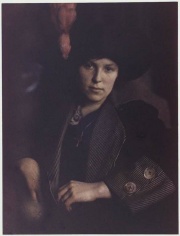Difference between revisions of "Autochrome"
Jump to navigation
Jump to search
(username removed) |
|||
| (3 intermediate revisions by 3 users not shown) | |||
| Line 1: | Line 1: | ||
| − | [[File:2001.335-SC21370.jpg|thumb|]] | + | [[File:2001.335-SC21370.jpg|thumb|Print from Autochrome<br>MFA# 2001.335]] |
== Description == | == Description == | ||
| − | A type of plate formerly used for color photography. Autochrome was the first successful process for color photos. It was developed in 1904 by Auguste and Louis Lumière of Lyon. They manufactured the plates from 1907 to 1933 at which point the plates were replaced by other color film products such as Lumicolor, Alticolor, and Filmcolor (Nadeau 1997). Autochrome plates contained a [ | + | A type of plate formerly used for color photography. Autochrome was the first successful process for color photos. It was developed in 1904 by Auguste and Louis Lumière of Lyon. They manufactured the plates from 1907 to 1933 at which point the plates were replaced by other color film products such as Lumicolor, Alticolor, and Filmcolor (Nadeau 1997). Autochrome plates contained a [[silver%20bromide|silver bromide]] gelatin photographic emulsion applied over a multicolored screen of tiny [[starch|starch]] grains dyed red, green, and blue. Following World War I, the potato starch matrix was replaced by [[gum%20arabic|gum arabic]] which gave a more uniform, less grainy appearance. |
== Synonyms and Related Terms == | == Synonyms and Related Terms == | ||
| Line 8: | Line 8: | ||
Autochrome process; Autochrome print; Lumicolor; Alticolor; Filmcolor | Autochrome process; Autochrome print; Lumicolor; Alticolor; Filmcolor | ||
| − | == | + | ==Resources and Citations== |
| − | + | * Website dedicated to "Autochromes Lumière" : '''http://www.autochromes.culture.fr''' | |
| − | + | * Preservation 101 glossary of terms at www.nedcc.org/p101cs/terms.htm | |
| − | |||
| − | * | ||
* Thomas B. Brill, ''Light Its Interaction with Art and Antiquities'', Plenum Press, New York City, 1980 Comment: gum arabic | * Thomas B. Brill, ''Light Its Interaction with Art and Antiquities'', Plenum Press, New York City, 1980 Comment: gum arabic | ||
Latest revision as of 13:36, 30 April 2022
Description
A type of plate formerly used for color photography. Autochrome was the first successful process for color photos. It was developed in 1904 by Auguste and Louis Lumière of Lyon. They manufactured the plates from 1907 to 1933 at which point the plates were replaced by other color film products such as Lumicolor, Alticolor, and Filmcolor (Nadeau 1997). Autochrome plates contained a Silver bromide gelatin photographic emulsion applied over a multicolored screen of tiny Starch grains dyed red, green, and blue. Following World War I, the potato starch matrix was replaced by Gum arabic which gave a more uniform, less grainy appearance.
Synonyms and Related Terms
Autochrome process; Autochrome print; Lumicolor; Alticolor; Filmcolor
Resources and Citations
- Website dedicated to "Autochromes Lumière" : http://www.autochromes.culture.fr
- Preservation 101 glossary of terms at www.nedcc.org/p101cs/terms.htm
- Thomas B. Brill, Light Its Interaction with Art and Antiquities, Plenum Press, New York City, 1980 Comment: gum arabic
- The Dictionary of Art, Grove's Dictionaries Inc., New York, 1996 Comment: "Photography" gives names and dates (1907-1935)
- Luis Nadeau, Encyclopedia of Printing, Photographic, and Photomechanical Processes, Atelier, New Brunswick, 1997 Comment: manufactured between 1907 and 1933
- Random House, Webster's Encyclopedic Unabridged Dictionary of the English Language, Grammercy Book, New York, 1997
